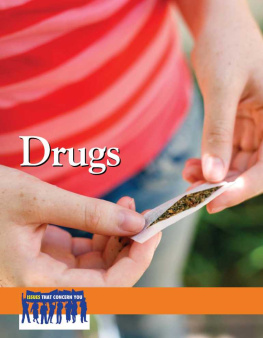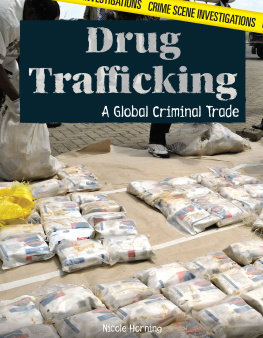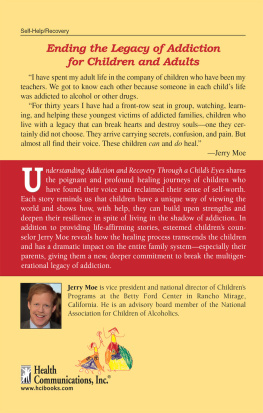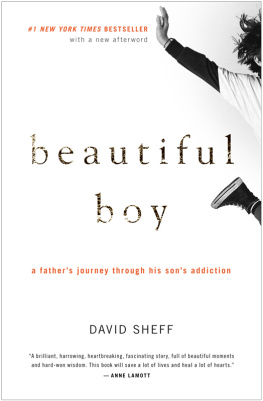DRUG ADDICTION
IN AUSTRALIA
Dr John Sherman & Tom Valenta
MICHELLE ANDERSON PUBLISHING
First published in Australia 2015
by Michelle Anderson Publishing Pty Ltd
P O Box 6032 Chapel Street North
South Yarra 3141, Melbourne, Australia
Tel: 61 3 9826 9028
Email:
www.michelleandersonpublishing.com
Copyright John Sherman and Tom Valenta 2015
Cover design: Workingtype, Melbourne
Typeset by: Midland Typesetters, Maryborough
Printed by: Toppan Security Printing Pte. Ltd, Singapore
National Library of Australia Cataloguing-in-Publication entry
Author: | Sherman, John, 1945- author. |
Title: | Drug addiction in Australia / Dr John Sherman, Tom Valenta. |
ISBN: | 9780855724405 (paperback) |
Notes: | Includes bibliographical references. |
Subjects: | Drug addictionAustralia. Drug addictsAustralia. Drug abuseAustralia. |
Other Authors/Contributors: |
Valenta, Tom, 1946- author. |
Dewey Number: 362.290994
Contents
Its a dreadful way to live, having a part of your brain that is out to kill you. I have a son, a partner, a good career and all these good things. And yet there is something in my head that tells me the best decision I can make on any given day is to go out and use heroin!
Peter, 38-year-old industrial chemist and recovering heroin addict.

Preface

F or more than forty years I have been practising pharmacotherapy, which is the treatment of people dependent on heroin and other opiates with medications such as methadone, buprenorphine mixed with naloxone (better known as Suboxone) and naltrexone.
On an average day I see around forty patients in my clinic at Footscray, an inner western suburb of Melbourne. Heroin is the drug of choice for most of my 1,000 patients, but few are dependent on only one drug. They use other opiates such as morphine, oxycodone and codeine. And about one-third will generally take whatever else they can get their hands onalcohol, cannabis, crystalline methamphetamine (ice) and the ever-increasing range of prescription and over-the-counter drugs that have psychoactive properties.
Few of my patients will make it to the average life expectancy in Australia: 79.5 for males and 84.0 for females. Most would do anything to become free of drug dependence but few ever get there.
An Australian Government research report published in 2013 found that almost 47,000 Australians received pharmacotherapy treatment for their opioid dependence on a snapshot day in June 2013. The report also found that the number of people receiving opioid pharmacotherapy in 2012 had almost doubled since 1998.
At my clinic the demographic profile of my patients reflects the diversity of Footscray and its surrounding suburbs: 50 per cent of my patients are of Vietnamese background and 40 per cent are Caucasian. The remaining 10 per cent comprise East Timorese, Nepalese, Filipino, Thai, Cambodian, Laotian, Indian (all from the Punjab), aboriginal, South American, African (Sudanese and Somali) and Egyptian. The average age of my patients is thirty-four; around 70 per cent are male and 30 per cent female.
My introduction to the world of drug dependence treatment came in 1973. As a young general practitioner I had just come back to Melbourne having worked in the country town of Broadford. I saw a job advertised in St Kilda by a Dr Sam Lees who was looking for a partner. He had an interest in the treatment of drug dependence, an area about which I knew nothing. He was treating people with a variety of drugs in an effort to get them to detoxify so that they could become drug-free. He had a few patients on methadone, a treatment that we now know as pharmacotherapy. The state government took over pharmacotherapy and ran the programs from a number of specialised clinics for several years. Then the program was privatised and GPs were asked to do courses in pharmacotherapy. The government-owned clinics were wound back, with several of the major clinics such as Gresswell, Pleasant View and Smith Street being closed.
I became interested because St Kilda was a Mecca of drug dependence like Kings Cross in Sydney and Soho in London. I was asked to join the Stamp Committee, which oversaw the substitution and methadone program for the Victorian Government. Its role was to draw up the guidelines for pharmacotherapy. It was also an educational and advisory body. Doctors were invited to do a short course on prescribing and I became one of the trainers. There were limits to the number of methadone patients that each doctor could have and only a handful took up the opportunity that we offered.
A small not-for-profit organisation called TaskForce that was based in Greville Street, Prahran, made contact with me in the early 1980s. The organisation was running programs for people with drug dependencies. Many were using heroin and wanted to get onto methadone. I ran some training programs that covered the most commonly used psychoactive drugs of the time, including heroin, cannabis, amphetamines (speed) and alcohol. From my time at TaskForce I realised for the first time that these heroin-addicted people werent Martians. At TaskForce they were given due respect and their needs were being met with a non-judgemental approach. I was middle class and had certain prejudices, one of them being that heroin addiction was a great sin. Its a view that a lot of people still have now. I learned that there is a different way. In 1984 a legendary worker in the drug and alcohol field, Peter Bucci, who had been at TaskForce, established the Windana Society, a drug-withdrawal house and therapeutic community. I chaired a committee for the establishment of Windana, was the inaugural president and was involved there for about ten years. I maintained my contact with TaskForce for some of those years but gradually wound back my involvement in everything other than Windana.
The practice in Barkly Street, St Kilda was sold to St Vincents Hospital in 2000 and soon after I began to see many more patients coming from Footscray and the inner west because there were few prescribers of methadone over there. The patients were coming over in a mini-bus organised by Richard Tregear, a well-known and highly regarded outreach worker from Footscray. I started doing one day a week in Footscray, which became two and then three days a week. Finally I resigned from St Vincents in 2010 and since then have worked four days a week in Footscray.
At the 2013 federal election, I stood for the Senate as a member of the Drug Law Reform Australia (DLRA) party. I share a belief that an entirely new approach is needed to combat drug and alcohol abuse in Australia. It needs to be treated primarily as a health issue, not a law-enforcement issue. Nations such as Switzerland and Portugal have led the reformation and achieved outstanding results, which others are now following. Our team did not win a seat at the election but we plan to continue campaigning for enlightenment.
In this book we do not try to cover the entire spectrum of drug abuse and addiction. We have looked in depth at the heroin story based on my experiences over the past forty-something years. Its not only the treatment we address but also the wider medical, psychological, social and historical issues. Because heroin is rarely the only drug used by addicts, we have touched on other drugs that are commonplace in Australian society. We also describe the impact of substance abuse on families and loved ones, on emergency services, on law enforcement, healthcare and other institutions.






